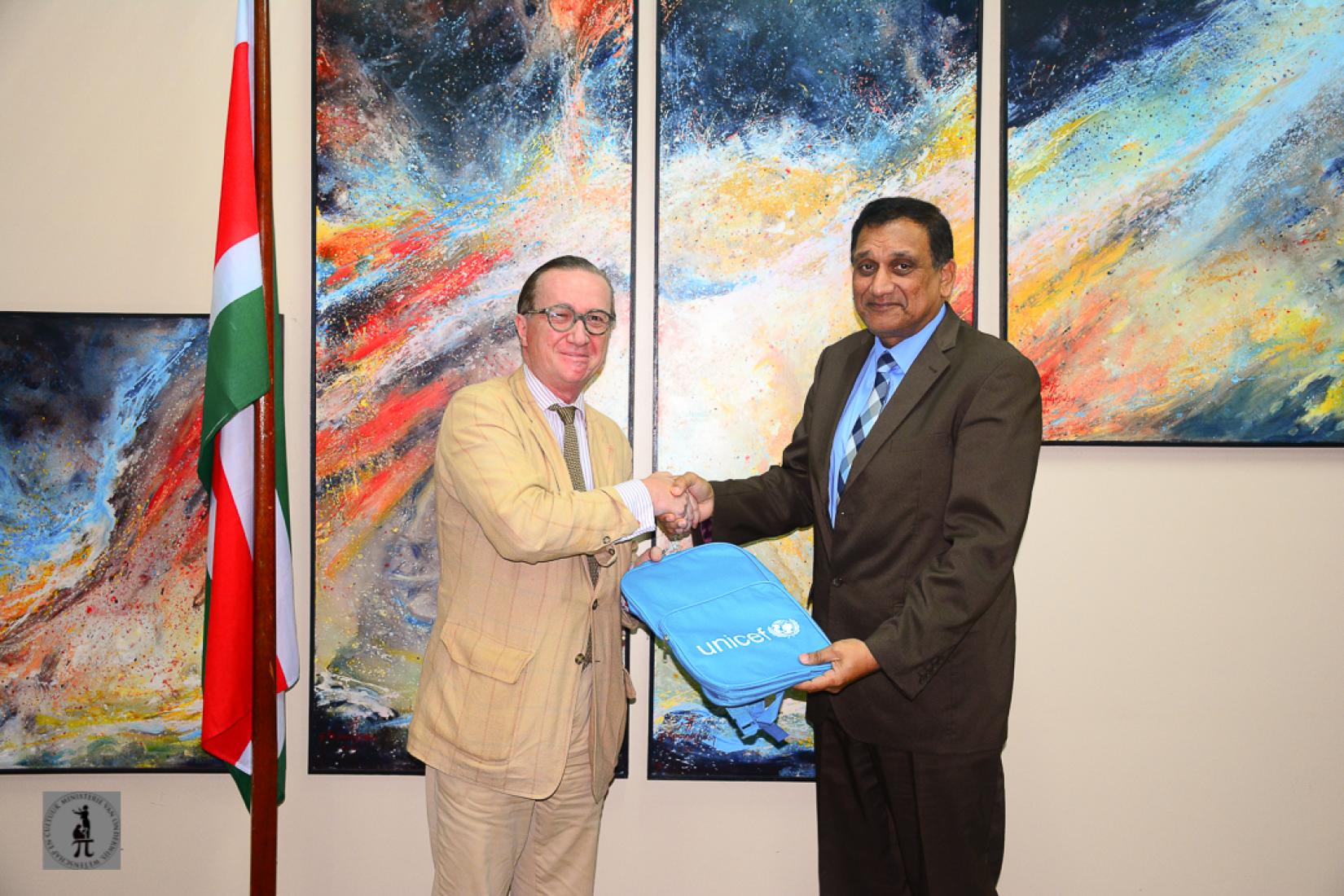Minister of Education Commits to 'UNICEF Commitment of Action for Foundational Learning'
24 January 2024
On the International Day of Education UNICEF calls for transformation of the education system for peace and sustainable development.

Paramaribo, 24 January 2024 – On the International Day of Education, under the theme "Learning for Sustainable Peace," UNICEF emphasizes its commitment to support the government of Suriname in providing universal access to quality education for every child.
UNICEF commends the government of Suriname for showing leadership in addressing and committing to solutions and actions in line with the sustainable development agenda 2030 for inclusive quality education.
Despite significant efforts, we must acknowledge the challenges in the education sector in recent years:
- Nationally, there was a decrease of approximately 2000 enrollments of children in primary education from 88,071 to 79,827 between 2019 and 2021, according to the Education Yearbook 2019-2021.
- The percentage of children not attending primary education reached a peak of 15.7 percent in 2021, compared to 6.1 percent in 2019.
- In secondary education, the number of non-enrolled children increased by 48.7 percent in 2021.
- The dropout rate in 2021 was 38.7 percent for vocational training.
In 2021, the education system underwent significant changes due to the aftershocks of the COVID-19 pandemic, including the expansion of primary education to include grades 9 and 10, followed by secondary education extending up to grades 14-16, depending on the type of education. Automatic promotion was also implemented in primary education, posing significant challenges for teachers, parents, and caregivers.
The most significant challenge was the decline in academic performance due to automatic promotion. As a result, children risk not passing the assessment for grade 10 without a change in awareness to maintain good academic performance, regardless of automatic promotion. The impact is particularly felt among children in the interior, where schools have been closed for extended periods due to emergencies such as floods and droughts. The decline in the education system is so significant that more children are now at risk of leaving school.
The shadow of the pandemic has not only affected Suriname but also other countries in the region. UNICEF data shows that four out of five sixth graders cannot read a simple text, and 4.3 million children are not attending school in Latin America and the Caribbean.
Now is the time to turn promises into action. To address the learning crisis in the region, UNICEF and its partners have developed a 'RAPID Framework' of short-term actions to rapidly recover from the decline in education. The 'RAPID' Framework emphasizes the following actions:
- Reach every child and create conditions to keep them in school.
- Regular assessments of learning levels.
- Prioritize learning fundamentals as building blocks of lifelong learning.
- Increase the efficiency of education by devising opportunities for catch-up education.
- Develop and invest in good mental health and well-being, ensuring every child is ready to learn.
This call to action underscores the urgency and importance of a collective effort to transform education, making it inclusive and resilient to the challenges of the 21st century.
UNICEF reaffirms its support to the Government of Suriname, particularly the Ministry of Education, and collaborates with relevant partners and stakeholders on solutions such as catch-up learning programs, innovations, and inclusive educational materials that cater to the educational needs of all types of learners. In 2023, UNICEF supported the Ministry in organizing an Education Congress to develop education policies, currently in the final stages. In the area of Foundational Learning, UNICEF supports, in collaboration with the Saga Foundation, modules for early stimulation and learning for 3-year-old children. This year, priority will also be given to the development of Early Childhood Development (ECD) policy. UNICEF also supports awareness programs on mental health and well-being for children and adolescents in schools.
Today, UNESCO and the Ministry of Education of Chile, along with CAF BANK, the World Bank, ECLAC, and UNICEF, convened a regional education meeting bringing together education ministers from the region at the ECLAC headquarters in Santiago, covering 33 countries with approximately 125 million students supported by 6.9 million teachers. The meeting aims to make progress in defining government policies focused on the recovery and transformation of education as accelerators of the education goals of Agenda 2030. The Minister of Education, His Excellency Minister Henri Ori, joined Education Ministers from Latin America and the Caribbean during the Education Meeting in Santiago this week, focusing on securing new commitments and actions in the area of foundational learning.



